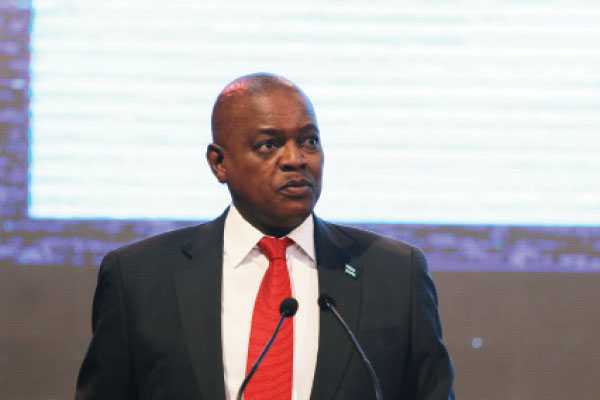President Masisi exposes Botswana to State Capture-Keorapetse
President Dr. Mokgweetsi Masisi’s insatiable appetite for acquisition of land all over the country and his interest to get Banyana farms and a tourism concession is not only unethical, but also exposes the country to state capture.
As if that was not enough, President Masisi has registered many companies after he assumed office. Member of Parliament for Selibe-Phikwe West, Dithapelo Keorapetse argued that all these are hallmarks of “state capture”. Keorapetse said the President’s privileges give him an unfair advantage over everyone. “The president has executive powers to govern, he gets intelligence briefs including on the economy and business opportunities, he is a regulator of businesses and can punish businesses which are wayward,” Keorapetse said, adding that conflict of interest cannot be avoided.
Keorapetse also expressed worry about Masisi’s acquisition of land all over the country and his interest to get Banyana Farms and a tourism concession saying such a move is unethical. According to Keorapetse there is need to revamp Botswana’s anti-corruption strategy by formulating and codifying anti-corruption policy. In his view the Policy will serve as a reference point in the broader fight against corruption. Keorapetse was speaking in Parliament in response to the Committee of Supply speech for the Ministry of Presidential Affairs, Governance and Public Administration, which was presented by Minister Kabo Morwaeng.
The MP called for a reform of all anti-corruption laws including Corruption and Economic Crime Act. He said the Act should be reviewed to make the Directorate on Corruption and Economic Crime (DCEC) independent of the executive especially the Office of the President. He argued that the Director General must be appointed by an independent Anti-Corruption Commission and that DCEC must be given a budget that enables it to carry out its operations. Concerning the DCEC Act, Keorapetse said the clause giving the president powers to restrict access of the DCEC, should be removed as it allows him to interfere with investigations. He said there was need to review other statutes such as the Whistle-blowing Act and the Declaration of Assets and Liabilities among others.
Presenting the 2021/2022 Development and Recurrent Budget for departments under his Ministry, Morwaeng said P1, 584, 641, 320 has been reserved for recurrent budgets, and another P622, 798, 683 for the Development Budget. He said the Ethics and Integrity Directorate established in terms of the Declaration of Assets and Liabilities Act of 2019 is operational and has started receiving declarations, as appropriate. “I therefore urge those affected by the Act to submit their declarations to help us to promote good governance and transparency in Botswana,” Morwaeng said. Morwaeng is expected to table an amendment to the Act during this current sitting of Parliament.
He will also table a Bill to establish a Committee to assess the remuneration and conditions of service of Members of Parliament, Councillors, Members of Ntlo ya Dikgosi and other Specified Officers. According to Morwaeng, the National Assembly Salaries and Allowances Act was amended in 2020 to incorporate car allowance at the rate of 10 percent of basic salary for Members of Parliament who are not provided with official vehicles. Payment of the allowance came into effect on 1st December 2020.
He said his ministry is at an advanced stage in setting up the Information and Data Protection Commission in accordance with the Data Protection Act of 2018. The Act provides for the protection of personal data to safeguard people’s rights to privacy. Under the management of Public Service, Morwaeng said government wage bill stood at 48.27 percent during the 2019/20 Recurrent Budget and 52.24 percent in 2020/21. The wage bill is projected to increase to 53.72 percent in the 2021/22 financial year, representing a 1.48 percent increase over the 2020/21 financial year.
He added that government is developing a comprehensive workforce plan for the Public Service. In the meantime, 50 percent of vacant posts are to be abolished effective 1st April, 2021 as an effort to reduce the wage bill. He said the total manpower requirements submitted by Ministries, Departments and Agencies for the 2021/2022 financial year stood at P1, 018, 977, 297. A significant number of these positions were required to adopt the new working conditions in the midst of COVID-19.
However, due to the economic downturn, additional funding for manpower has been deferred except for 290, 000, 000 for Ministries of Basic Education at P260, 000,000, and Health and Wellness at P30, 000, 000. On prevention of corruption, Morwaeng said the Directorate of Corruption and Economic Crime continues to develop and implement strategies for addressing corruption through the promotion of good governance best practice. DCEC has now introduced and implemented interventions such as Corruption Audits, Corruption Risk Assessments, Corruption Risk Management policies and action plans in public institutions. During the 2020/2021 planning period, institutions were capacitated to effectively implement recommended anti-corruption measures.
He said DCEC is in the process of developing a Quality Management System (QMS) for certification by the Botswana Bureau of Standards (BOBS). This QMS will help the DCEC to improve public confidence and customer satisfaction about its products and services. The programme was funded by the United Nations Development Programme (UNDP) which is also providing technical assistance for DCEC to establish an operational Results-based Monitoring and Evaluation (RBM&E) and reporting system to strengthen the agency’s efficiency, effectiveness, and accountability.





